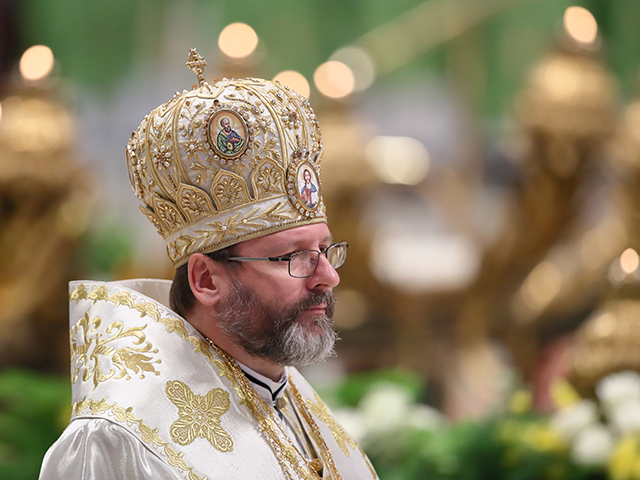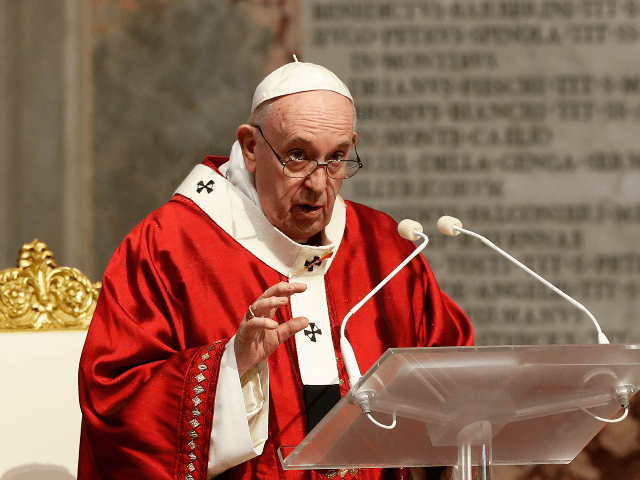Ukrainian political and religious leaders have objected strongly to a speech by Pope Francis exalting Russian history.
“You are the heirs of great Russia: the great Russia of saints, monarchs, the great Russia of Peter the Great, of Catherine II, that Russian empire — great, enlightened, great culture and great humanity,” the pontiff said via a live video address to young Russian Catholics gathered in St. Petersburg this weekend for the All-Russian Catholic Youth Day.
“Never give up this legacy, you are the heirs of the great Mother Russia, go ahead with it. And thank you. Thank you for your way of being, for your way of being Russians,” he told them.
Ukrainian officials said the pope’s comments — pronounced last Friday but only made public on Monday — constituted “imperialist propaganda.”
“It’s a shame that Russian great-power ideas, which are the cause of Russia’s chronic aggression, consciously or unconsciously sound from the lips of the pope, whose mission, in our opinion, is precisely to open the eyes of Russian youth to the disastrous course of the current Russian leadership,” said Oleg Nikolenko, spokesman for the Ministry of Foreign Affairs in Kiev.
Ukrainian Major Archbishop Sviatoslav Shevchuk joined in the criticism, saying the pope’s words had caused “great sorrow and concern.”

The Ukrainian Major Archbishop Sviatoslav Shevchuk in the Vatican City, October 28th, 2018 Grzegorz Galazka/Mondadori Portfolio via Getty Images)
“We assume that his Holiness’s words were spoken spontaneously, without the intention of giving a historical assessment, much less of supporting Russia’s imperialist ambitions,” the archbishop said in a statement.
“Despite this, we share the great pain caused by his observations in bishops, clergy, monks and faithful not only of our Church, but also of other Christian confessions, as well as representatives of other religious confessions,” he added.
Shevchuk said the pope’s words about “the great Russia of Peter I, Catherine II, of that empire — great and enlightened, a country of great culture and great humanity” refer to “the worst example of Russian imperialism and extreme nationalism,” he declared.
“We fear that those words are understood by some as an encouragement of precisely this nationalism and imperialism, which is the real cause of the war in Ukraine,” the archbishop continued. “War that brings death and destruction to our people every day.”
In point of fact, this is exactly how Russian officials chose to exploit the story.
Dmitrij Peskov, spokesman for the Kremlin, told the state-run TASS news agency he welcomed the pope’s words.
“This is not the first time that Ukrainians have criticized Pope Francis for his aspirations for Russia,” Peskov said. “Previously, Kiev had rejected Francis’ proposals for mediation to achieve peace in Ukraine.”
“The pontiff knows Russian history, and that’s very positive,” he stated. “It is really deep and has deep roots. This legacy should be constantly passed on to our young people and must be remembered.”
On Tuesday morning, the pope’s spokesman Matteo Bruni said that Francis’ words had been taken out of context.
“In his words of greeting addressed off the cuff to some young Russian Catholics in recent days, as is clear from the context in which he pronounced them, the pope intended to encourage young people to preserve and promote what is positive in the great Russian cultural and spiritual heritage,” Bruni said in a press release, “and certainly not to exalt imperialist logic and government personalities, cited to indicate some historical periods of reference.”

COMMENTS
Please let us know if you're having issues with commenting.